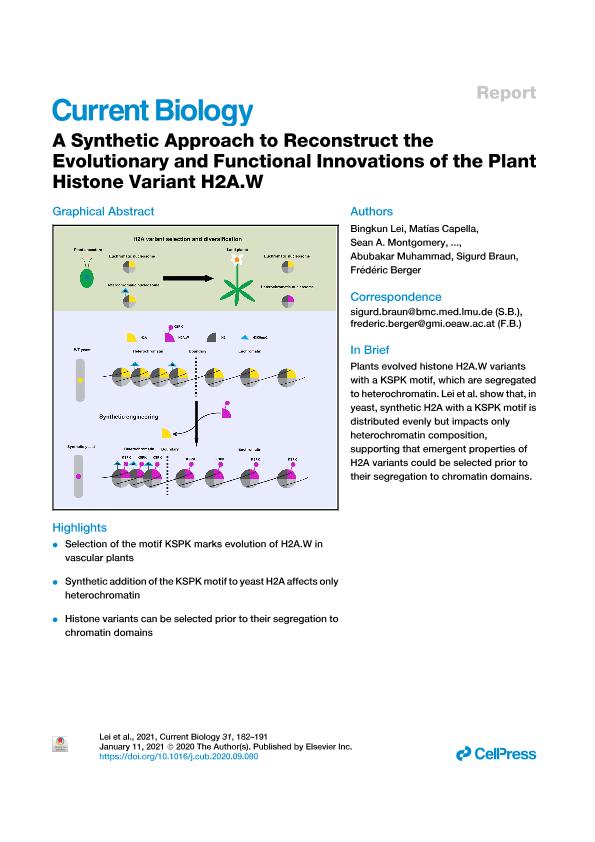Mostrar el registro sencillo del ítem
dc.contributor.author
Lei, Bingkun
dc.contributor.author
Capella, Matias

dc.contributor.author
Montgomery, Sean A.
dc.contributor.author
Borg, Michael
dc.contributor.author
Osakabe, Akihisa
dc.contributor.author
Goiser, Malgorzata
dc.contributor.author
Muhammad, Abubakar
dc.contributor.author
Braun, Sigurd
dc.contributor.author
Berger, Frédéric
dc.date.available
2023-01-19T14:09:33Z
dc.date.issued
2021-01
dc.identifier.citation
Lei, Bingkun; Capella, Matias; Montgomery, Sean A.; Borg, Michael; Osakabe, Akihisa; et al.; A Synthetic Approach to Reconstruct the Evolutionary and Functional Innovations of the Plant Histone Variant H2A.W; Cell Press; Current Biology; 31; 1; 1-2021; 182-191.e5
dc.identifier.issn
0960-9822
dc.identifier.uri
http://hdl.handle.net/11336/185011
dc.description.abstract
Diversification of histone variants is marked by the acquisition of distinct motifs and functional properties through convergent evolution.1–4 H2A variants are distinguished by specific C-terminal motifs and tend to be segregated within defined domains of the genome.5,6 Whether evolution of these motifs pre-dated the evolution of segregation mechanisms or vice versa has remained unclear. A suitable model to address this question is the variant H2A.W, which evolved in plants through acquisition of a KSPK motif7 and is tightly associated with heterochromatin.4 We used fission yeast, where chromatin is naturally devoid of H2A.W, to study the impact of engineered chimeras combining yeast H2A with the KSPK motif. Biochemical assays showed that the KSPK motif conferred nucleosomes with specific properties. Despite uniform incorporation of the engineered H2A chimeras in the yeast genome, the KSPK motif specifically affected heterochromatin composition and function. We conclude that the KSPK motif promotes chromatin properties in yeast that are comparable to the properties and function of H2A.W in plant heterochromatin. We propose that the selection of functional motifs confer histone variants with properties that impact primarily a specific chromatin state. The association between a new histone variant and a preferred chromatin state can thus provide a setting for the evolution of mechanisms that segregate the new variant to this state, thereby enhancing the impact of the selected properties of the variant on genome activity.
dc.format
application/pdf
dc.language.iso
eng
dc.publisher
Cell Press

dc.rights
info:eu-repo/semantics/openAccess
dc.rights.uri
https://creativecommons.org/licenses/by-nc-nd/2.5/ar/
dc.subject
CHROMATIN
dc.subject
EVOLUTION
dc.subject
H2A.M
dc.subject
H2A.W
dc.subject
HETEROCHROMATIN
dc.subject
HISTONE
dc.subject
HISTONE VARIANT
dc.subject
STREPTOPHYTES
dc.subject.classification
Bioquímica y Biología Molecular

dc.subject.classification
Ciencias Biológicas

dc.subject.classification
CIENCIAS NATURALES Y EXACTAS

dc.title
A Synthetic Approach to Reconstruct the Evolutionary and Functional Innovations of the Plant Histone Variant H2A.W
dc.type
info:eu-repo/semantics/article
dc.type
info:ar-repo/semantics/artículo
dc.type
info:eu-repo/semantics/publishedVersion
dc.date.updated
2022-09-21T16:17:58Z
dc.journal.volume
31
dc.journal.number
1
dc.journal.pagination
182-191.e5
dc.journal.pais
Estados Unidos

dc.description.fil
Fil: Lei, Bingkun. Gregor Mendel Institute; Austria
dc.description.fil
Fil: Capella, Matias. Consejo Nacional de Investigaciones Científicas y Técnicas. Centro Científico Tecnológico Conicet - Santa Fe. Instituto de Agrobiotecnología del Litoral. Universidad Nacional del Litoral. Instituto de Agrobiotecnología del Litoral; Argentina
dc.description.fil
Fil: Montgomery, Sean A.. Gregor Mendel Institute; Austria
dc.description.fil
Fil: Borg, Michael. Gregor Mendel Institute; Austria
dc.description.fil
Fil: Osakabe, Akihisa. Gregor Mendel Institute; Austria
dc.description.fil
Fil: Goiser, Malgorzata. Gregor Mendel Institute; Austria
dc.description.fil
Fil: Muhammad, Abubakar. Universitat Technical Zu Munich; Alemania
dc.description.fil
Fil: Braun, Sigurd. Universitat Technical Zu Munich; Alemania
dc.description.fil
Fil: Berger, Frédéric. Gregor Mendel Institute; Austria
dc.journal.title
Current Biology

dc.relation.alternativeid
info:eu-repo/semantics/altIdentifier/url/https://linkinghub.elsevier.com/retrieve/pii/S0960982220314913
dc.relation.alternativeid
info:eu-repo/semantics/altIdentifier/doi/http://dx.doi.org/10.1016/j.cub.2020.09.080
Archivos asociados
